The Roses: Australian writer Tony McNamara is famed for his razor-sharp wit
Australian writer Tony McNamara is as famed for his witty scripts as any director is for their creative vision. It’s why Olivia Colman and Benedict Cumberbatch sought him out for their first project together.
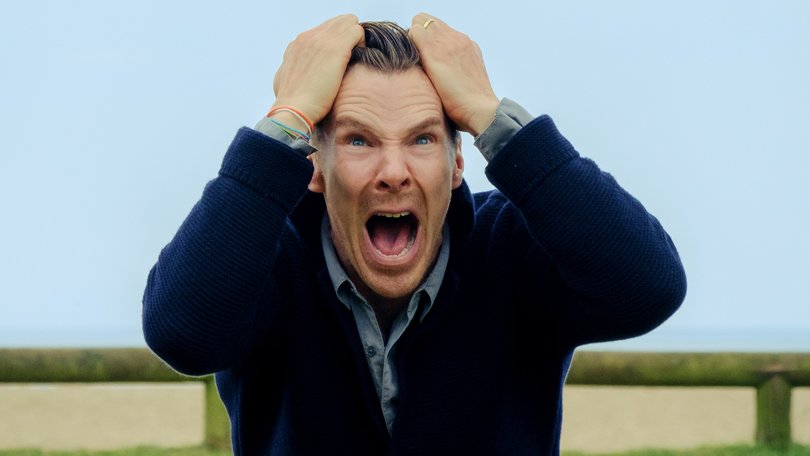
In the credits of most films, the director lays claim along the lines of “A Martin Scorsese Picture”, “A Steven Spielberg Film” or “A Spike Lee Joint”.
Filmmaking is a collaborative art but the director is seen as kind of “owning” the project as the driving force behind the creative decisions. TV is the writer’s medium but film belongs to the director.
Unless your name is Tony McNamara, the Australian screenwriter whose talent for sharp and witty dialogue and incisive observations about the absurdities of human nature has made him a name whose involvement trumps, or at least matches, the director.
Sign up to The Nightly's newsletters.
Get the first look at the digital newspaper, curated daily stories and breaking headlines delivered to your inbox.
By continuing you agree to our Terms and Privacy Policy.When long-time friends Benedict Cumberbatch and Olivia Colman wanted to mount their first project together, it was a writer they sought first, and it was McNamara they wanted.
“He’s quite extraordinary in how he shifts tone, and is able to hold very complex tones in one beat, let alone shifting them,” Cumberbatch said. “And he’s dynamite, and he’s such an easygoing Australian, a laidback genius.
“He’s a proper person.”
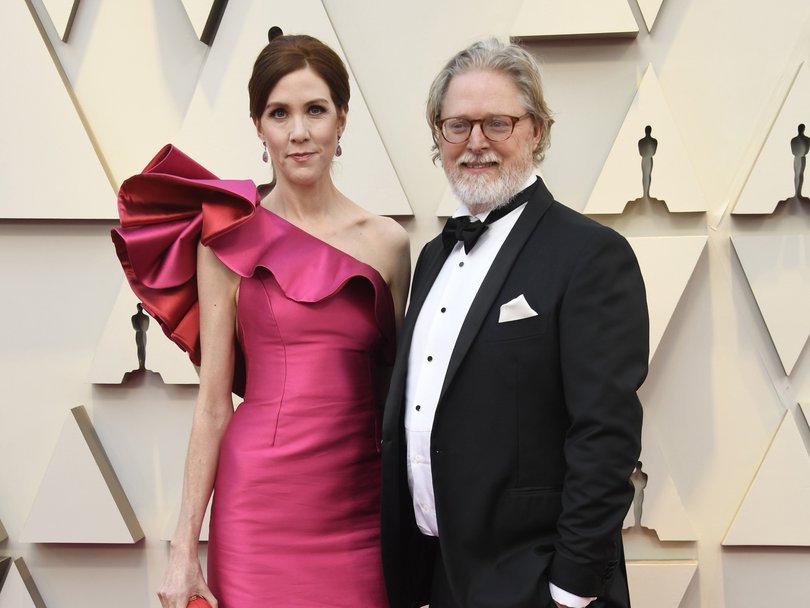
Colman had worked with McNamara before on The Favourite with director Yorgos Lanthimos. McNamara’s script was full of playful barbs that could sting and kill, as well as emotional beats that punched you right in the heart. It, and her performance, won Colman her Oscar.
The result of those initial meetings between the three is The Roses, not a remake but inspired by the 1989 Michael Douglas, Danny DeVito and Kathleen Kennedy film, The War of the Roses, and the Warren Adler novel from which it was adapted.
“Sometimes a film is beautiful the first time around, and you don’t want to touch,” Colman. “We are not trying to remake it, it was a jumping off point. We’ve taken it in a slightly different direction, it’s a different tone.
“With Tony McNamara writing it, you are in safe hands. He does darkly funny better than anyone. Then it didn’t seem so much of a risk.”
For McNamara, the 1989 movie was a story about a divorce and he wanted to make a movie about marriage.
“A contemporary marriage and the pressures of two ambitious partners in a society that says you have to do something special with your life,” he told The Nightly. “And there are egos, and balancing the kids and money, and how the world sees you and how you see each other if one you fails.
“All of that felt like good, contemporary stuff for a comedy of characters who were going to be idiots.”
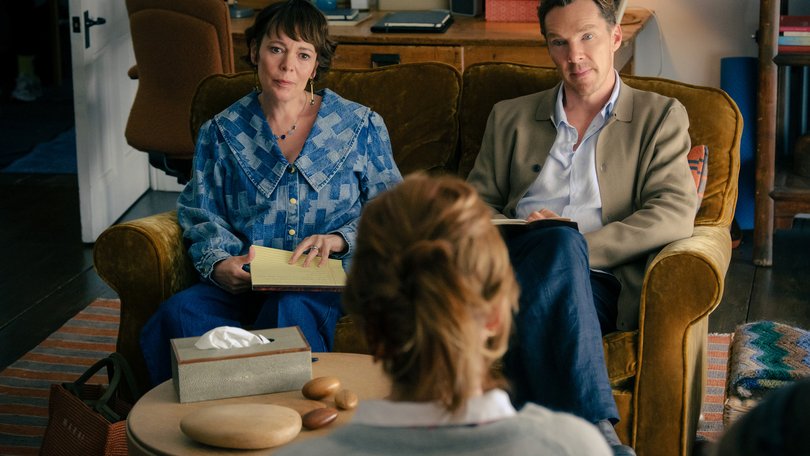
The Roses sticks with the narrative framework of a well-to-do couple whose long marriage starts to fall apart as they become increasingly contemptuous of each other, but many changes were made.
The lead characters were now British – Theo (Cumberbatch), a successful architect, and Ivy (Colman), a restauranteur – who moved to the US some years earlier.
Knowing that he was writing for Colman and Cumberbatch gave McNamara a supercharged confidence.
“They’re so good with language and language is important to me. I know I can give them four pages of sitting across a dinner table and go at each other, and the rhythm will work and they’ll build it beautifully,” he said.
The ensemble cast also included Andy Samberg, Kate McKinnon, Zoe Chao and Jamie Demetriou as their friends, Ncuti Gatwa and Sunita Mani as Ivy’s employees, Allison Janney as a lawyer, and Belinda Bromilow as a couples therapist – a murderers row of funny, funny people.
Only after McNamara was onboard as both writer and producer, did the film recruit its director, Jay Roach.
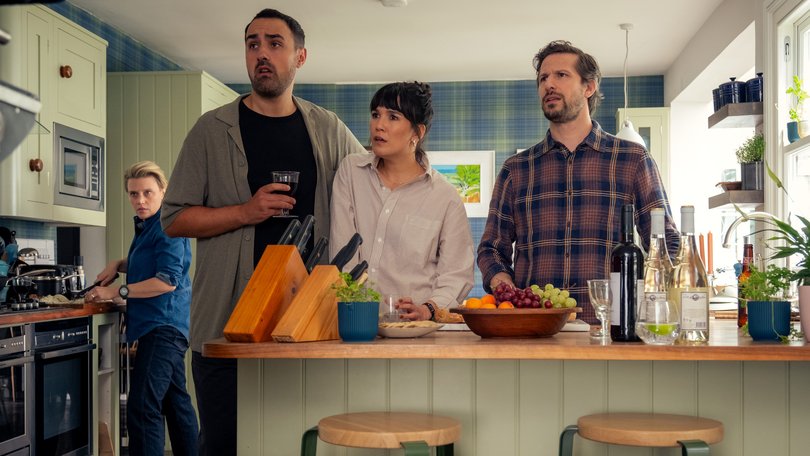
This version spends more time with Ivy and Theo in their happier days, which makes their later estrangement and cruelty all the more cutting. We see them at their best and their worst, but you never not root for them.
“Ideally for me, sometimes he’s right and sometimes she’s right. You were supposed to feel neither was perfect and neither was right. You could flip between the two characters if you want to take a side,” McNamara said of keeping audiences on side.
Mani joked that Ivy and Theo’s “love language” is particular and punishing, and that “maybe is what we’re all kind of thinking and feeling underneath sometimes”.
Demetriou added, “the heightened nature of some of the exchanges expose the reality of feeling within a relationship that burning desire to just absolutely let out everything you feel on the person you spend the most time with”.
When McNamara was younger, he was a waiter and would spend his shifts watching people and, often, couples fighting, and while he didn’t make notes at the time, it was all banked somewhere in his mind, ready to be drawn on.
“The worst thing I witnessed was in a very quiet restaurant in Melbourne, and there’s almost no one in it. There was me and this couple, and they were probably like 60. They literally ate everything without speaking for 10 minutes, and she went, very loudly, ‘I’ve wasted my life with you’.
“Then he didn’t say anything and they just kept eating. He never responded, they ate in silence and at the end, he came up and gave me a really good tip.”
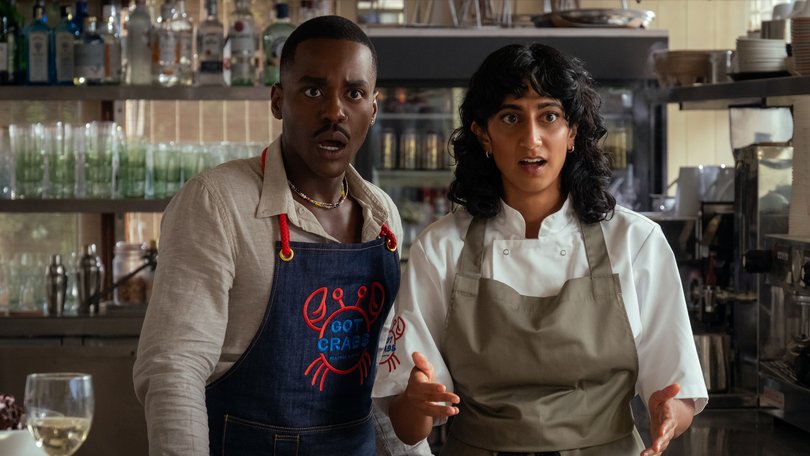
Long-term relationships can be easily frayed and frazzled.
Ivy and Theo can get really mean as they unleash hell on each other - in a dinner party scene, Gatwa’s character says, “Sometimes, Ivy is mad at me and I can’t even tell”, and Ivy whips out, “Sometimes, (Theo) has his cock in me and I can’t even tell” - but the current that runs beneath it all is still, against the odds, love.
“It was more important they both kept trying, and that was why you should stay with them, that they were trying, badly, but they were trying, so long as they kept trying, I felt like the audience would stay with them to some degree,” McNamara said.
As zany and entertaining as it was to watch actors of Colman and Cumberbatch’s calibre run the whole gamut from compassion and tenderness to petty and cruel, The Roses still has something instructive to say about tangled bonds.
“It was really, for me, about those moments you take or don’t take, the moments of kindness you take or the moments of cruelty you take, what that all adds up to. They probably took too many moments of cruelty and not enough of kindness.
“That’s why it’s a cautionary tale. Be aware of the moments in a 20-year marriage.”
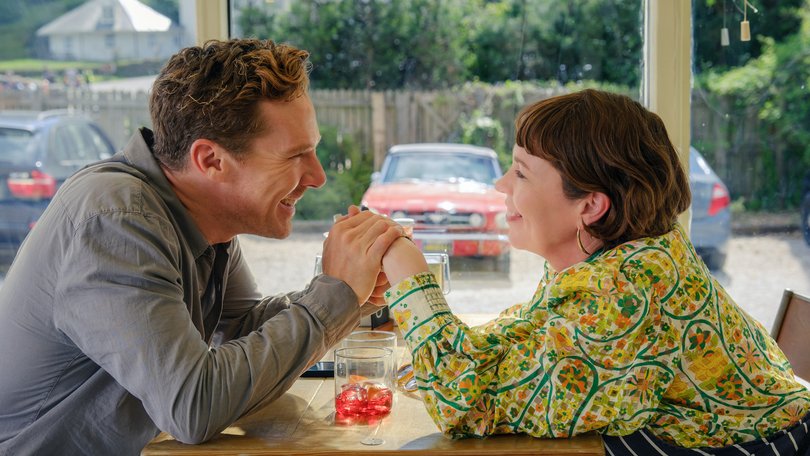
Cumberbatch took another lesson, about the perils of trying to change someone.
“It’s a huge mistake in human behaviour to find the thing that you found attractive, now unattractive just because you’ve grown bored,” he said. “Unfortunately we have this constant need to be entertained, to have new things, to be distracted, and it’s a lot to do with conditioning, the environment and all the other things that go into psychology.
“But you’d be very, very wary. You have to love the whole thing. You have to love that someone is enough, rather than wanting this to be more or less something. You also have to be in love with the idea that you can’t f—king change someone.
“They are who they are, you can just nurture them, you can help them if they want your help. You can’t go about changing them.”
McNamara is known on the world stage, but he got his start in Australia, on films such as The Rage in Placid Lake and TV shows including The Secret Life of Us, Love My Way and Tangle.
After the runaway success of The Favourite, he created and ran his own show, the brilliantly caustic and clever costume comedy The Great, a highly fictionalised story of Russia’s Catherine the Great. Another collaboration with Lanthimos, Poor Things, brought the second of his two Oscar nominations.
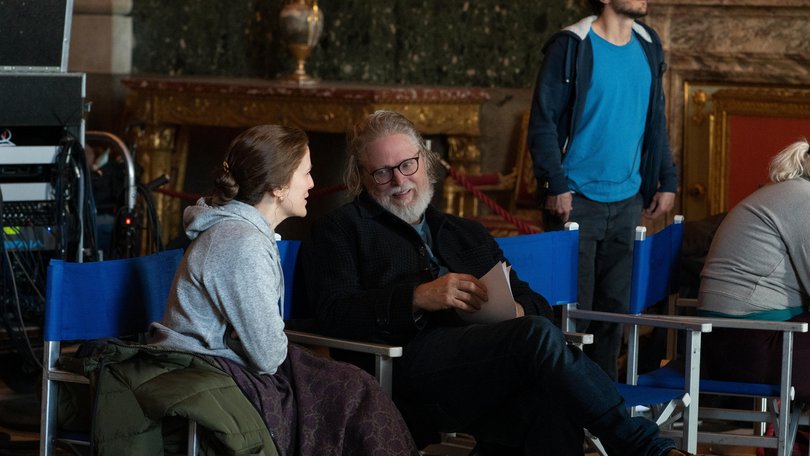
But even before all those Australian favourites, McNamara honed his craft for a spiky word on the playground at Assumption College in his hometown of Kilmore.
“I grew up in a very sharp-talking school. It was fast put-downs. It was a funny place because we didn’t really fight physically, but you did take each other down verbally,” he recalled.
Has he ever written something that pushed it too far, that was too spiteful or nasty?
“Yes, but not often. I don’t remember specifically but (it happened) more on The Great because I had a writers room and occasionally they’d be, ‘We can’t do that’ and I’d be like, ‘And that’s why we will’,” he said.
“But there have been occasions I’ve taken things out or I’ve listened to the better angels and gone, ‘Mate, pull yourself together’. I learnt that in theatre as well, you can go too far and alienate an audience.”
McNamara may have a gift for crafting the most injurious insult, but to Colman, he’s “amazing and a really gorgeous human being”.
As for his standing in the industry, Zoe Chao nutshelled it best. “Tony McNamara has such a specific, delicious voice. Yes, it’s a ‘remake’ but this movie feels like it’s its own film too.
“And it does feel like a Tony McNamara film.”
The Roses is in cinemas now

